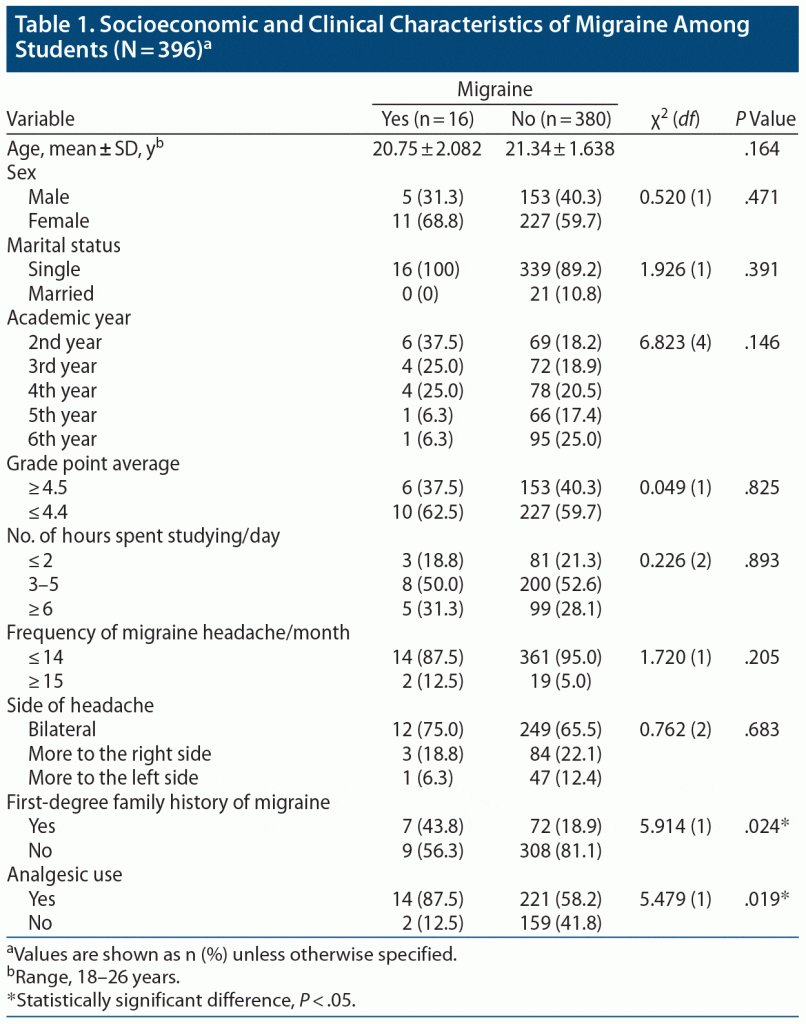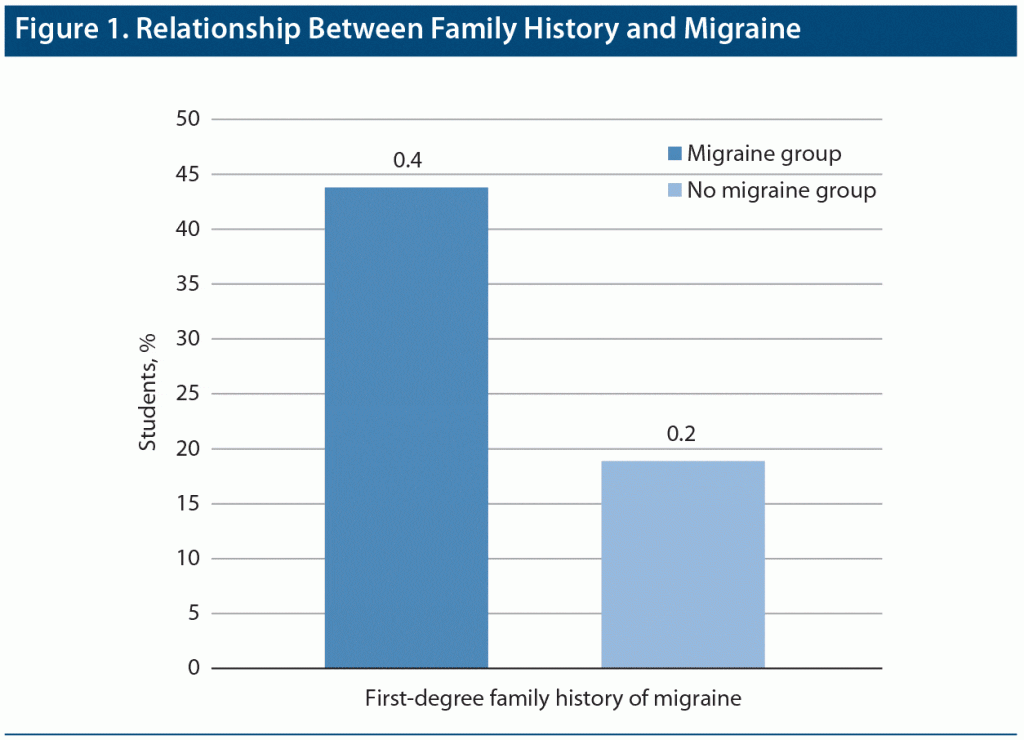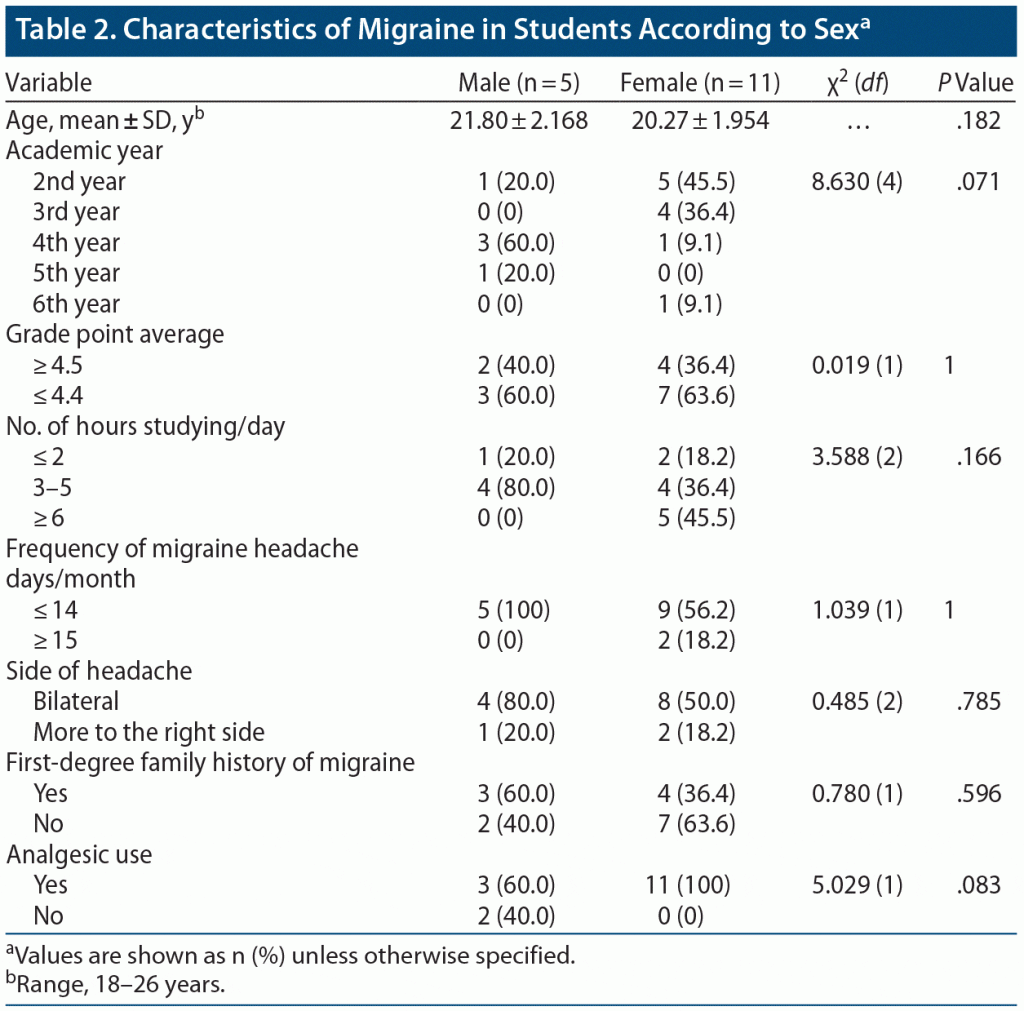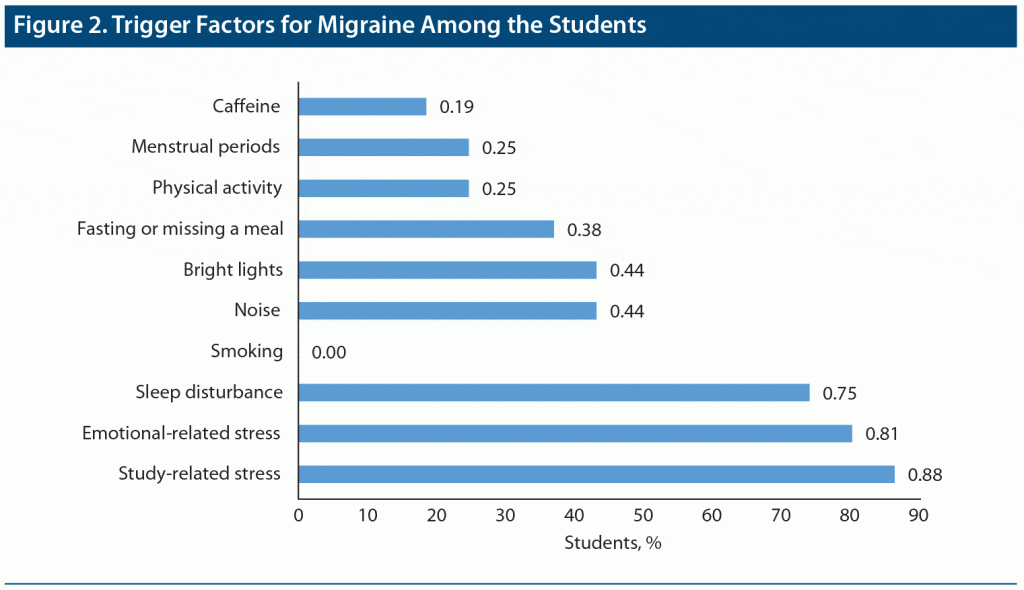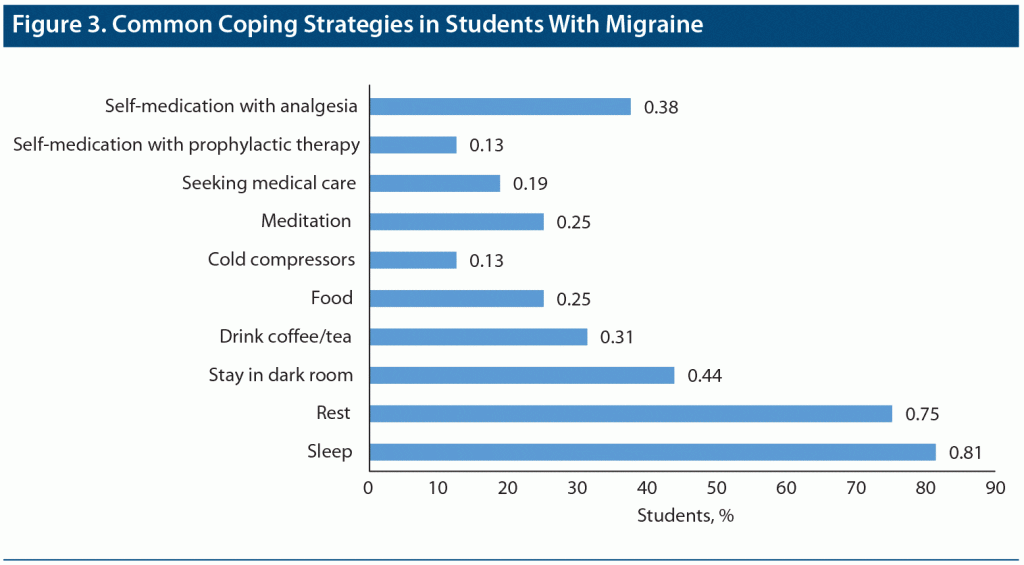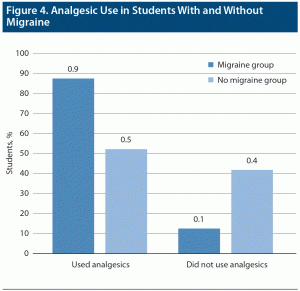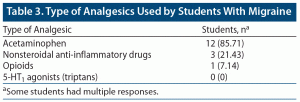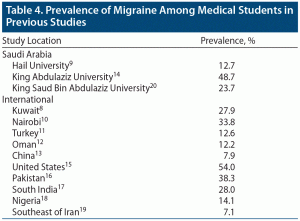ABSTRACT
Objective: To determine the prevalence, characteristics, and triggers of migraine and coping strategies used among medical students in Saudi Arabia.
Methods: This cross-sectional descriptive study was conducted among undergraduate students in the College of Medicine of Imam Abdulrahman Bin Faisal University, Dammam, Saudi Arabia. Included students were in their second to sixth academic year of the Bachelor of Medicine or Bachelor of Surgery programs during the 2019–2020 academic year. The diagnosis of migraine was made according to the International Classification of Headache Disorders, Third Edition criteria.
Results: A total of 396 students participated in the study; 238 (60.1%) were female and 158 (39.9%) were male. Their age ranged between 18 and 26 years old, with a mean age of 21.32 ± 1.659 years. Only 16 of 396 students fulfilled the criteria for migraine, with a prevalence of 4.04%. Migraine prevalence was higher in females (n = 11, 4.6%) compared to males (n = 5, 3.1%), with a female:male ratio of 1.5:1. The most common triggers associated with migraine were study-related stress (88%) and emotional-related stress (81%).
Conclusions: This project was undertaken to evaluate prevalence, triggers, and coping strategies of migraine among medical students. The prevalence of migraine headache in this study was lower compared to other national and international universities, with a higher female to male ratio. Stress was a major trigger among our study population. The findings of this study will add to the growing body of literature on migraine.
Prim Care Companion CNS Disord 2021;23(5):20m02859
To cite: Aljaafari D, Aldossary N, Almuaigel MF, et al. Prevalence of migraine prevalence, characteristics, triggers, and coping strategies among medical students in Saudi Arabia. Prim Care Companion CNS Disord. 2021;23(5):20m02859.
To share: https://doi.org/10.4088/PCC.20m02859
© Copyright 2021 Physicians Postgraduate Press, Inc.
aDepartment of Neurology, College of Medicine, Imam Abdulrahman Bin Faisal University, Dammam, Saudi Arabia
*Corresponding author: Danah Aljaafari, MD, Department of Neurology, College of Medicine, Imam Abdulrahman Bin Faisal University, 2835, King Faisal Rd, Dammam 34212, Saudi Arabia ([email protected]).
Headache is a highly prevalent neurologic disorder, especially migraine. Primary headache disorders including migraine greatly impact social, economic, and psychological aspects of life.1 The International Classification of Headache Disorders, Third Edition (ICHD-3) describes migraine as “recurring attacks of unilateral, throbbing headache that last from 4 to 72 hours, moderate to severe intensity, aggravated by regular physical activities and associated with nausea, vomiting, photophobia, or phonophobia.”2(18)
Migraine headaches affect 12% of the global population3 and 25% of the Saudi population.4 Migraine is considered the third most common disorder after dental caries and tension-type headache, respectively, and is ranked as the seventh disabling illness worldwide according to the Global Burden of Disease Study 2015.5
Migraine is predominant in women during their 20s and 30s.6 According to the World Health Organization, the male:female ratio for migraine is approximately 1:2.6 The higher prevalence in females has been related to estrogen levels.7
Prevalence of migraine in medical students has been found to vary between 7.14% and 54%.8–20 Migraine is considered a significant health problem among university students due to its negative influence on their academic performance, daily activities, and quality of life.13,21
The student lifestyle including long hours of working and studying and sleep deprivation has been linked to fatigue, stress, and anxiety, which are common triggers for migraine attacks.22 Medical students are considered part of a special group of students due to the heavy study load and prolonged years of education.13,15
Previous studies10,13,15,19,22 of migraine among medical students showed that paracetamol and non–steroidal anti-inflammatory drugs (NSAIDs) are 2 of the most commonly used analgesia. Sleep, rest, hot showers, water or food intake, self-medication, acupuncture/massage, and prescribed medication are used as coping mechanisms.13,16
This is the first study, to the best of our knowledge, to estimate the prevalence of migraine in medical students in Dammam, Saudi Arabia. The objective was to determine the prevalence, characteristics, triggers, and coping strategies associated with migraine among medical students attending Imam Abdulrahman Bin Faisal University (IAU) located in Dammam, Saudi Arabia.
METHOD
Subjects and Study Design
This cross-sectional descriptive study was conducted among undergraduate students in the College of Medicine at IAU and included students in their second to sixth academic year of the Bachelor of Medicine or Bachelor of Surgery programs during the 2019–2020 academic year. The sample size was calculated according to a pre-established formula.23
The estimated sample size needed to achieve a precision of ± 0.05% with a 95% confidence interval (CI) was 257 participants. Students who did not complete the questionnaire were excluded.
The study included 515 medical students with a 77% response rate; 119 students were excluded due to incomplete questionnaires. A total of 396 students completed and returned the questionnaires.
Participation in the study was completely voluntary. Confidentiality was strictly assured, and no names were required from the participants. The study was approved by the Institutional Ethics Review Board of IAU (reference no. 2019–01-277).
Validity of the Questionnaire
The validity of the questionnaire was confirmed by a pilot study (unpublished data; Danah Aljaafari, MD; 2019) in 30 participants and was reviewed by 3 neurologists. The reliability coefficient was found to be > 0.6, which confirmed that the questionnaire was suitable for use in this study.
Data Collection
Data were collected via a structured self-administered questionnaire designed to fulfill the study objectives. The first part contained questions related to the demographics including age, sex, marital status, academic year, grade point average, height, and weight in addition to the number of hours spent studying per day, smoking status, and first-degree family history of migraine.
The second part consisted of questions related to the ICHD-3 diagnostic criteria for migraine. The third part was composed of headache triggers, frequency, and coping strategies and type of analgesia used. Questions were dichotomous yes/no items and single/multiple choice.
Diagnostic Criteria
The diagnosis of migraine was made according to ICHD-3 criteria2 wherein at least 5 headache attacks fulfill the following: (1) the attack lasts 4–72 hours; (2) the attack is associated with at least 2 of the following features: unilateral headache, pulsatile in nature, moderate or severe intensity, and aggravated by or leading to avoiding routine physical activities; and (3) during the attack at least 1 of the following complaints is present: nausea and/or vomiting, photophobia, or phonophobia. The headache characteristics should not better fulfill the criteria of another ICHD-3 headache diagnosis.2 Headaches that fulfilled ICHD-3 criteria were considered migraine headaches, whereas headaches that did not fulfill the criteria were considered nonmigrainous headaches.
Statistical Analysis
All data were analyzed with SPSS 21.0. Continuous data were represented as mean ± SD and categorical and nominal data as frequencies and percentages. χ2 test was used to test the relationship between the qualitative variables, and independent t test was used for the quantitative variables. A P value < .05 was regarded as statistically significant.
RESULTS
A total of 396 students participated in the study; 238 (60.1%) were female and 158 (39.9%) were male. They ranged in age from 18 to 26 years with a mean ± SD age of 21.32 ± 1.659 years. The mean ± SD age of the students with migraine was lower (20.75 ± 2.082 years) than those without migraine (21.34 ± 1.638 years).
Academic Year
There were more females than males in all academic years. Most of the students participating in the study were in their sixth year (n = 96, 24.2%), followed by fourth (n = 82, 20.7%), third (n = 76, 19.2%), second (n = 75, 18.9%), and fifth (n = 67, 16.9%), respectively. Migraine headaches were higher in students in their second year, followed by students in their third and fourth year, which represents 37.5% and 25.0% of students with migraine, respectively.
ICHD-3 Criteria
According to the ICHD-3, we found that only 16 of 396 students fulfilled the criteria for migraine, with a prevalence of 4.04%. Migraine prevalence was higher in females (n = 11, 4.6%) compared to males (n = 5, 3.1%), with a female-to-male ratio of 1.5:1.
Family History of Migraine
As shown in Table 1, migraine was significantly higher among students with a first-degree family history of migraine compared to students without migraine (P < .05) (Figure 1).
Frequency and Side of Migraine Headache
The majority of participants with migraine experienced bilateral headaches (75.0%), followed by right-sided (18.8%) and left-sided (6.3%) headaches. A preponderance of students with migraine experienced ≤ 14 headache days/month (87.5%), while only 12.5% had ≥ 15 headache days/month.
Table 1 shows that the differences between migraine and nonmigrainous headache were statistically significant for family history and analgesic use (P < .05). However, differences between the 2 groups for age, sex, marital status, academic year, grade point average, hours spent studying, and frequency and side of headache were nonsignificant (P > .05).
There was no significant difference between males and females regarding age, academic year, grade point average, hours spent studying, frequency and side of headache, family history of migraine, or use of analgesics (Table 2).
Triggers of Migraine
Study-related stress (88%) and emotional-related stress (81%) were the most common triggers associated with migraine followed by sleep disturbance (75%), bright lights (44%), noise (44%), fasting or missing a meal (38%), physical activity (25%), menstrual periods (25%), and caffeine (19%) (Figure 2).
Coping Strategies
The main coping strategy in migraine participants was sleep (81%), followed by rest (75%), stay in dark room (44%), self-medication with analgesia (38%), drink coffee/tea (31%), food (25%), meditation (25%), seek medical care (19%), cold compressors (13%), and self-medication with prophylactic therapy (13%) (Figure 3).
Analgesia Use
The majority of students with migraine (87.5%) used analgesia to relieve their headache (Figure 4). Acetaminophen (85.7%) was the most common analgesic used for migraine followed by NSAIDs (21.4%) and opioids (7.1%). Surprisingly, none of the students with migraine used 5-HT1 agonists (triptans), as shown in Table 3.
DISCUSSION
This study was conducted among undergraduate medical students at IAU in the academic year 2019–2020. Until now, this study is the first university survey evaluating the prevalence of migraine based on self-report in the College of Medicine at IAU.
The IAU medical program requires constant concentration, continuous effort, and hard work. Absence from lectures and laboratories can affect the student’s college performance and success even if it was only 1 day. Therefore, diagnosis and treatment of migraine headache are important for both students and the treating doctors.
The prevalence of migraine among medical students is variable worldwide.8 This study found the prevalence of migraine among IAU medical students to be 4.04%. This prevalence was lower compared to other national and international studies of prevalence of migraine among medical students (Table 4). These differences in migraine prevalence could be explained by the methods used, the period of time when the study was conducted (eg, during midterms or final examinations), and presence of well-established counseling services at IAU.
The female preponderance of migraine in virtually all studies is reflected in our study, with a female:male ratio of 2.2:1, and this could be explained by estrogen hormone levels.7 Twenty-five percent of female students reported that their menstrual period is a trigger factor for migraine similar to other studies,7,24 which is due to the sudden decrease of the estradiol hormone in plasma.
Family history of migraine is important. In this study, we found that 43.8% (P < .05) of medical students had a positive family history of migraine. Al-Hashel et al8 found that family history was an important factor in the prevalence of migraine. They8 reported that 53.3% of migraine-diagnosed students had a positive family history of migraine with highly significant association (P < .0001).8 Another study18 found that only 28.6% of participants had a family history of migraine.
This study showed migraine prevalence to be higher among second-year students. Another study showed higher migraine prevalence among first- and second-year junior students.13 This finding could be explained by adaptation and learning overload in a new environment.
Regarding the trigger factors for migraine, in reviewing the literature, stress and sleep disturbance were the most common triggers, which was confirmed in this study. We found that study-related stress (88%) and emotional-related stress (81%) were the most common triggers associated with migraine, followed by sleep disturbance (75%). Other triggers included bright light, noise, fasting, menstrual period, and caffeine intake. Another study10 on migraine among medical students found that stress (24.9%) was the most common trigger factor, followed by irregular sleep (20.8%). An additional study21 reported that exam stress (82.6%), sleep disturbance (79.9%), and emotional stress (73.2%) were common trigger factors.
Analgesic medications are often used to relieve migraines, as show in our study (87.5%). Acetaminophen (85.7%) was used most often, followed by NSAIDs (21.4%) and opioids (7.1%); however, none of the students use 5-HT1 agonists. Previous studies found that paracetamol9 was the most commonly used analgesia among students, followed by NSAIDs.12,14,18,22 The best explanation for these findings is that these medications are available over the counter.
The most common coping strategies found in our study were sleep (81%) and rest (75%). One study9 reported that comfort, exercise, and analgesic use were the most common coping strategies used in their population (38.1%). Another study8 found the most important relieving factors to be rest and sleep (63.5%) and medication (33.2%), followed by darkening of the room (30.3%), massage therapy (20.1%), and drinking coffee (18.0%).
CONCLUSIONS
In this study, the aim was to assess migraine prevalence among medical students at IAU, which was found to be lower compared to similar studies from other universities, however, comparable to prevalence of migraine in the Saudi population. This prevalence may reflect the coping strategies used among the IAU medical students. Limitations include use of a self-administered survey in which some questions could have been misunderstood and risk of subjectivity in the answers.
Submitted: November 6, 2020; accepted December 31, 2020.
Published online: September 30, 2021.
Potential conflicts of interest: None.
Funding/support: None.
Clinical Points
- Primary headache disorders including migraine have a great impact on social, economic, and psychological aspects of life.
- Coping strategies for migraine headache are important and include good sleep hygiene, rest, and avoidance of well-known migraine attack triggers.
References (24)

- Baarmah, Z, Martelletti P, Katsarava Z. A study on headache disorder in Kingdom of Saudi Arabia (October 2013). Int J Health Med. 2016;1(1):23–29.
- Headache Classification Committee of the International Headache Society (IHS). The International Classification of Headache Disorders, 3rd edition. Cephalalgia. 2018;38(1):1–211. PubMed CrossRef
- Yeh WZ, Blizzard L, Taylor BV. What is the actual prevalence of migraine? Brain Behav. 2018;8(6):e00950. PubMed CrossRef
- Al Jumah M, Al Khathaami AM, Kojan S, et al. The prevalence of primary headache disorders in Saudi Arabia: a cross-sectional population-based study. J Headache Pain. 2020;21(1):11. PubMed CrossRef
- Steiner TJ, Birbeck GL, Jensen RH, et al. Headache disorders are third cause of disability worldwide. J Headache Pain. 2015;16(1):58. PubMed CrossRef
- World Health Organization. Headache Disorders and Public Health: Education and Management Implications. Geneva, Switzerland: World Health Organization; 2000.
- Macgregor EA, Rosenberg JD, Kurth T. Sex-related differences in epidemiological and clinic-based headache studies. Headache. 2011;51(6):843–859. PubMed CrossRef
- Al-Hashel JY, Ahmed SF, Alroughani R, et al. Migraine among medical students in Kuwait University. J Headache Pain. 2014;15(1):26. PubMed CrossRef
- Alharbi AH, Alharbi SH, Albalawi AMA, et al. Migraine among medical and non-medical students of Hail University. Egyptian J Hospital Med. 2018;71(6):3343–3350.
- Amayo EO, Jowi JO, Njeru EK. Migraine headaches in a group of medical students at the Kenyatta National Hospital, Nairobi. East Afr Med J. 1996;73(9):594–597. PubMed
- Balaban H, Semiz M, Şentürk İA, et al. Migraine prevalence, alexithymia, and post-traumatic stress disorder among medical students in Turkey. J Headache Pain. 2012;13(6):459–467. PubMed CrossRef
- Deleu D, Khan MA, Humaidan H, et al. Prevalence and clinical characteristics of headache in medical students in Oman. Headache. 2001;41(8):798–804. PubMed CrossRef
- Gu X, Xie Y. Migraine attacks among medical students in Soochow University, Southeast China: a cross-sectional study. J Pain Res. 2018;11:771–781. PubMed CrossRef
- Ibrahim NK, Alotaibi AK, Alhazmi AM, et al. Prevalence, predictors and triggers of migraine headache among medical students and interns in King Abdulaziz University, Jeddah, Saudi Arabia. Pak J Med Sci. 2017;33(2):270–275. PubMed CrossRef
- Johnson H, Guhl G, Arora J, et al. Migraine in students of a US medical school. Fam Med. 2014;46(8):615–619. PubMed
- Khan H, Khattak H, Jamali R, et al. Prevalence of migraine, its common triggering factors and coping strategies in medical students of Peshawar. Khyber Medical University J. 2012;4(4):187–192.
- Menon B, Kinnera N. Prevalence and characteristics of migraine in medical students and its impact on their daily activities. Ann Indian Acad Neurol. 2013;16(2):221–225. PubMed CrossRef
- Ojini FI, Okubadejo NU, Danesi MA. Prevalence and clinical characteristics of headache in medical students of the University of Lagos, Nigeria. Cephalalgia. 2009;29(4):472–477. PubMed CrossRef
- Shahrakai MR, Mirshekari H, Ghanbari AT, et al. Prevalence of migraine among medical students in Zahedan Faculty of Medicine (Southeast of Iran). Basic Clin Neurosci. 2011;2(2):20–25.
- Alwahbi MK, Alamri MM, Alammar AM, et al. Prevalence of migraine among medical students of King Saud bin Abdulaziz University for Health Sciences. Int J Sci Res. 2017;6(2):894–898.
- Gouhar GK, Tamimm RE, AlMahri SM, et al. Migraine among Princess Nourah Bint Abdulrahman University students in Riyadh, Saudi Arabia. Int J Med Developing Countries. 2018;2(3):103–108. CrossRef
- Desouky DE, Zaid HA, Taha AA. Migraine, tension-type headache, and depression among Saudi female students in Taif University. J Egypt Public Health Assoc. 2019;94(1):7. PubMed CrossRef
- Thrusfield M. Veterinary Epidemiology. 3rd ed. Oxford, UK: Blackwell Science Ltd; 2007.
- Breslau N, Rasmussen BK. The impact of migraine: epidemiology, risk factors, and co-morbidities. Neurology. 2001;56(6 suppl 1):S4–S12. PubMed CrossRef
Enjoy this premium PDF as part of your membership benefits!
